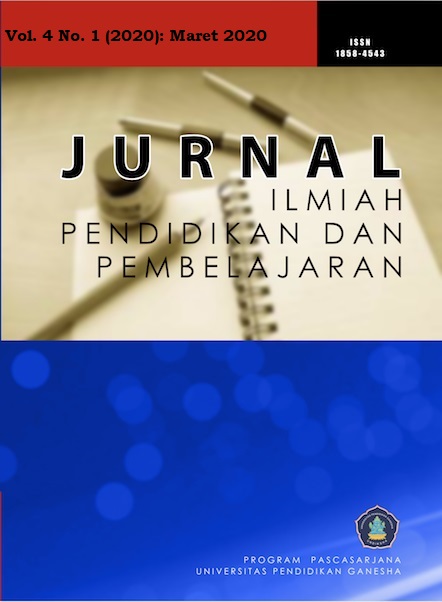Evaluasi Pelaksanaan Program Praktek Kerja Industri pada Kompetensi Keahlian Nautika Kapal Niaga
DOI:
https://doi.org/10.23887/jipp.v4i1.24172Abstract
Problems in the implementation of apprenticeship students in the Nautika Kapal Niaga expertise in SMKN 2 Painan students include the difficulty of adjusting the apprenticeship schedule to the shipping industry, the lack of competence with student work opportunities has an impact on the low ability of students after implementing internship. Research methods are quantitative research methods and qualitative research methods whose use is adjusted to the desired data needs to answer research questions. Research respondents are each party involved in carrying out internship and 40 students. The instrument for qualitative research uses interview guidelines and specific observation guidelines for prakerin preparation data, while quantitative research data uses questionnaire instruments, learning outcomes tests and rubric of practical learning outcomes assessment. The results showed that 1) Formative evaluation related to the assessment of the implementation process of the apprenticeship in preparation of the apprenticeship had good results, the assessment of the implementation of teacher assignments (77%) was in the medium category and the industry supervisor (63%) was in the poor category, students' perceptions on the application of the teacher's tasks 69 % and industry advisers 66%, meaning that improvements still need to be done because they have moderate (sufficient) value. The results of the study on the assessment of the scope of work carried out by apprenticeship activities carried out by students 82% with good categories at stage I, 83% with good categories at stage II, 80% with good categories at stage III, 67% categorized as being at stage IV and 62% categorized poor in stage V, the overall average score is at an average of 74% in the medium category, 2) summative evaluation related to the assessment of the results of the perceived apprenticeship in the realm of attitude the overall average score in the learning outcomes of the realm of attitude is 72% in the medium category, the realm psychomotor practice 1 with an average of 80 and practice II with an average of 83, the value of good category and students declared competent in practice, in the cognitive realm obtained an average of 71.20 this score is still below the KKM in the cognitive domain that is 75, cognitive learning outcomes indicate that students' cognitive abilities still need to be improved.
Keywords: Internship, Formative Evaluation, Summativ Evaluation
References
Anugerah dkk. (2017). “Evaluasi Pelaksanaan Program Prakerin Berdasarkan Pedoman Prakerin Di SMKN 3 Depok Program Keahlian Batu & Beton”. Tesis. Malang: Program Pascasarjana UNM.
Arikunto, Suharsimi, & Jabar, Cepi Safruddin Abdul. (2019). Evaluasi Program Pendidikan. Jakarta: Bumi Aksara
Cronbach L J, Ambron S, Dornbusch S, Hess R, Hornik R, Phillips D, Walker D, Weiner S. (1980). Toward Re-form of Program Evaluation: Aims, Methods and In-stitutional Arrangements. Jossey-Bass, San Fran-cisco, California
Cross, A. (1973). Home Economics Evaluation. Columbus Ohio: A Bell & Howel Company.
Depdikbud. (1997. Institusi Pasangan Pendidikan Sistem Ganda. Unit Fasilitas Desentralisasi Pendidikan, Jakarta.
Depdiknas. (2003). Undang-Undang RI Nomor 20 Tahun 2003. Tentang Sistem Pendidikan Nasional
Miller, C. (1985). Factors Affecting Blood Pressure and Heart Rate. Available from: [Accessed 2 November 2012] http://www.livestrong.com/article/196479-factors-affecting-bloodpressure-heart-rate/ [Accessed 5 May 2012].
Purwanto. (2011). Evaluasi Hasil Belajar. Yogyakarta: Pustaka Pelajar.
Saputra, dkk. (2017). “Evaluasi Implementasi Praktik Kerja Industri Di SMK”. Tesis. Bandung: Program Pascasarjana UPI.
Scriven, M. (1980). Educational thesaurus (2nd eds.). CA: Edgepress.
Stufflebeam Daniel L. (2007). Evaluation, Theory, Models, Applicarion. San Francisco CA: Wholey.
Sukanti. (2005). Efektivitas Pelaksanaan Praktik Kerja Lapangan Program D III Fakultas Ilmu Sosial Universitas Negeri Yogyakarta. Jurnal Pendidikan Akuntasi Indonesia. Volume 4, Nomor (2).
Tayibnafis, Farida Yusuf. (2008) Evaluasi Program dan Instrumen Evaluasi. Jakarta: Rineka Cipta.
Trilling, B., & Fadel, C. (2009). 21st Century Skills Learning for Life in Our Times. San Francisco, CA John Wiley & Sons.
Tyler, Melissa Conley. (2005). A Fundaental Choise: Internal or External Evaluation. Evaluation Journal of Australasia 4(1-2) : 3-11.
Waskita. Sadewa Aji. (2015). “Evaluasi Program Praktik Kerja Industri Pada Bidang Keahlian Teknik Instalasi Tenaga Listrik di SMK Swasta Se-Kabupaten Sleman”. Tesis. Yogyakarta: Program Pascasarjana UNY.
Widoyoko, Eko Putro. (2012). Evaluasi Program Pembelajaran, Panduan Praktis Bagi Pendidik dan Calon Pendidik. Yogyakarta: Pustaka Pelajar.
Wijaya, Etistika Yuni; Dwi Agus Sudjimat; Amat Nyoto. (2016). Transformasi Pendidikan Abad 21 Sebagai Tuntutan Pengembangan Sumber Daya Manusia Di Era Global. Volume 1 Tahun 2016 – ISSN 2528-259.
Wirawan. (2011) Evaluasi, Teori, Model, Standar, Aplikasi, dan Profesi. Contoh Aplikasi Evaluasi Program: Pengembangan Sumber Daya Manusia, Program Nasional Pemberdayaan Masyarakat (PNPM) Mandiri Perdesaan, Kurikulum, Perpustakaan dan Buku Teks. Jakarta: Rajawali Pers.
Worthen, R Blaine & Sanders R James. (1989). Educational Evaluation Theory and Practice. Wosgington: Charles A. Jones Publishing Company
Yumaroh, dkk. (2014). “Pengembangan Instrumen Evaluasi Program Praktik Kerja Industri Kompetensi Keahlian Teknik Audio Video SMK”. Tesis. Semarang: Program Pascasarjana UNNES.
Downloads
Published
How to Cite
Issue
Section
License
Authors who publish with the Jurnal Ilmiah Pendidikan dan Pembelajaran (JIPP) agree to the following terms:
- Authors retain copyright and grant the journal the right of first publication with the work simultaneously licensed under a Creative Commons Attribution License (CC BY-SA 4.0) that allows others to share the work with an acknowledgment of the work's authorship and initial publication in this journal.
- Authors are able to enter into separate, additional contractual arrangements for the non-exclusive distribution of the journal's published version of the work (e.g., post it to an institutional repository or publish it in a book), with an acknowledgment of its initial publication in this journal.
- Authors are permitted and encouraged to post their work online (e.g., in institutional repositories or on their website) prior to and during the submission process, as it can lead to productive exchanges, as well as earlier and greater citation of published work. (See The Effect of Open Access)










